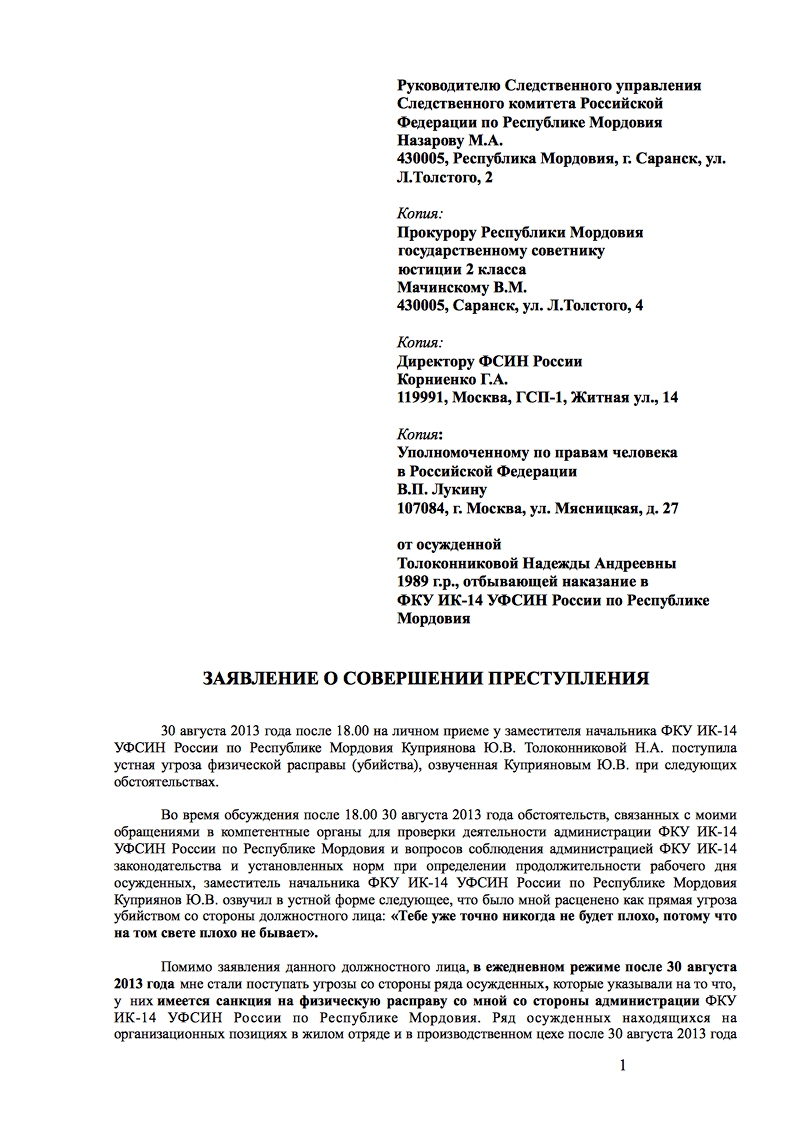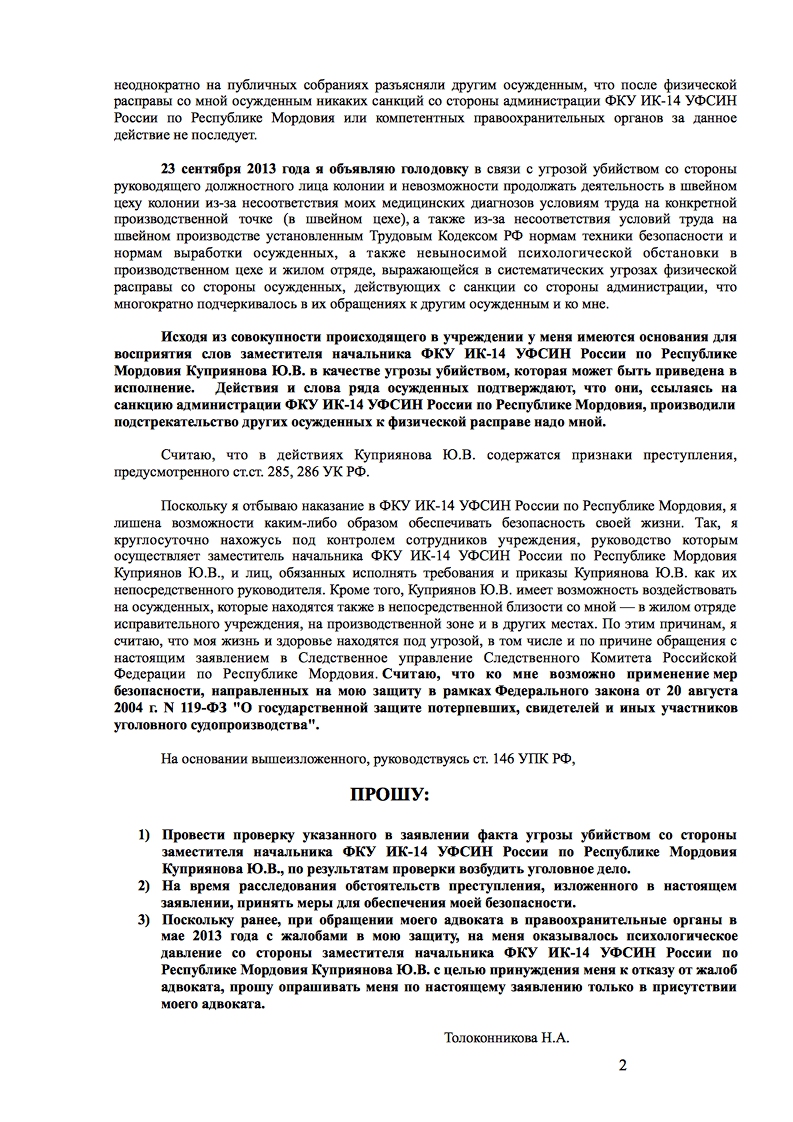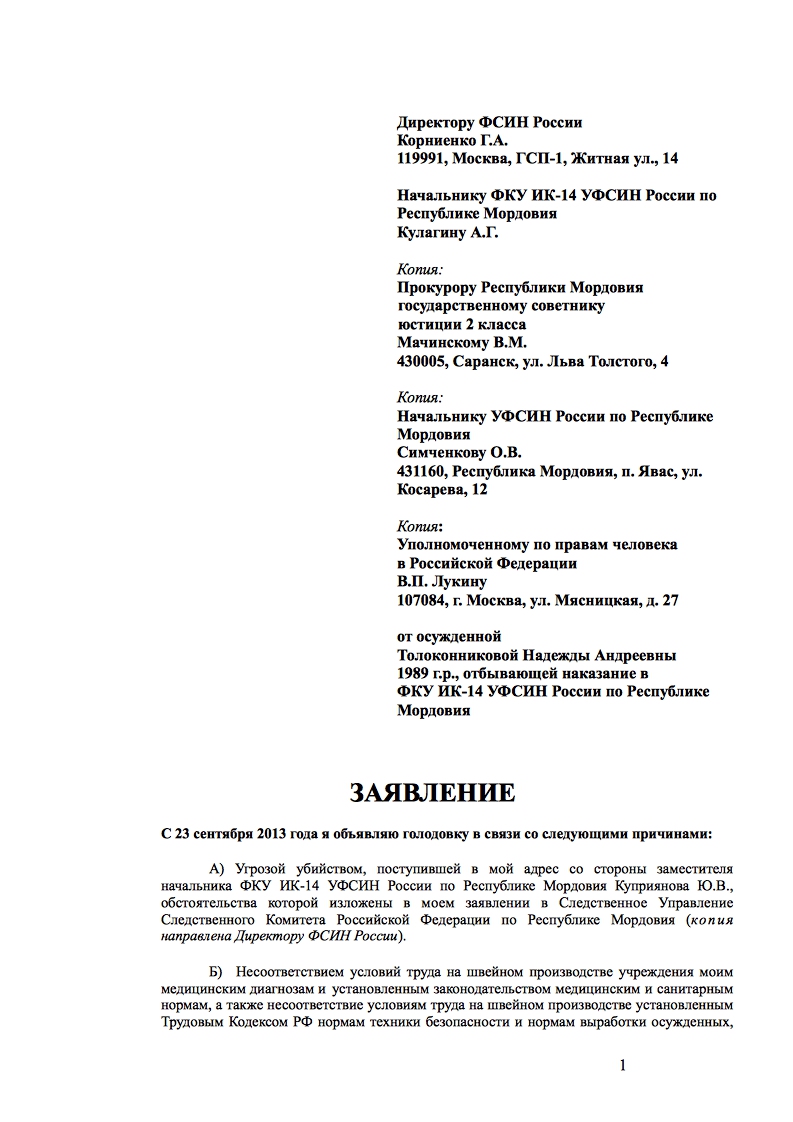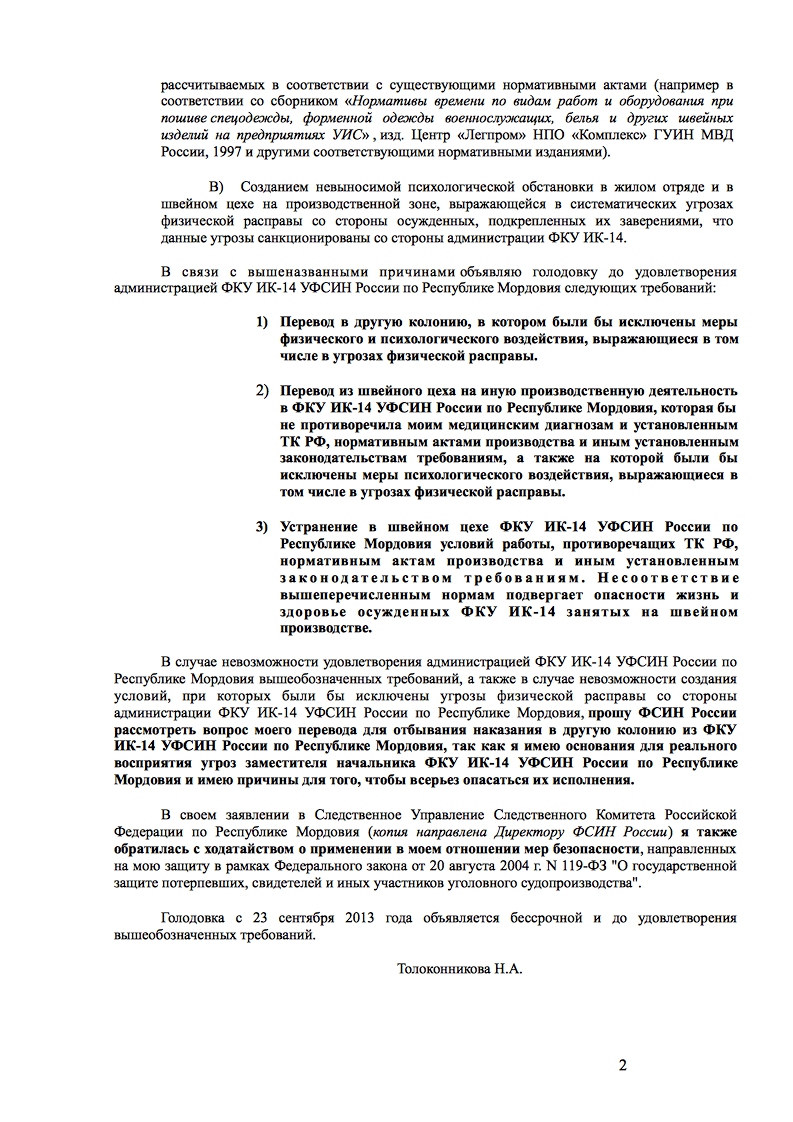Nadezhda Tolokonnikova Declares Hunger Strike
September 23, 2013
This morning, Nadezhda Tolokonnikova handed in two documents to the special unit of the Mordovian penal colony IK-14 in the village of Partsa – an appeal to the Investigative Committee about the threat of murder from the deputy head of the colony, Lieutenant Colonel Kupriyanov, and a statement about starting a hunger strike and refusing to work in the sewing shop of the colony in connection with the mass violation of the rights of convicted women in production. Nadezhda is contraindicated to spend 8 hours a day at a sewing machine for medical reasons – even the doctors of the prison administration forbade her to do such work for so long due to problems with her spine. Until the last moment, Nadezhda tried not to enter into a confrontation with the leadership of the colony, but after the deputy head of the camp began to threaten to kill her, she decided to declare a hunger strike until her demands are met – a transfer to another camp and bringing the situation at the IK-14 production facility into line with the law.
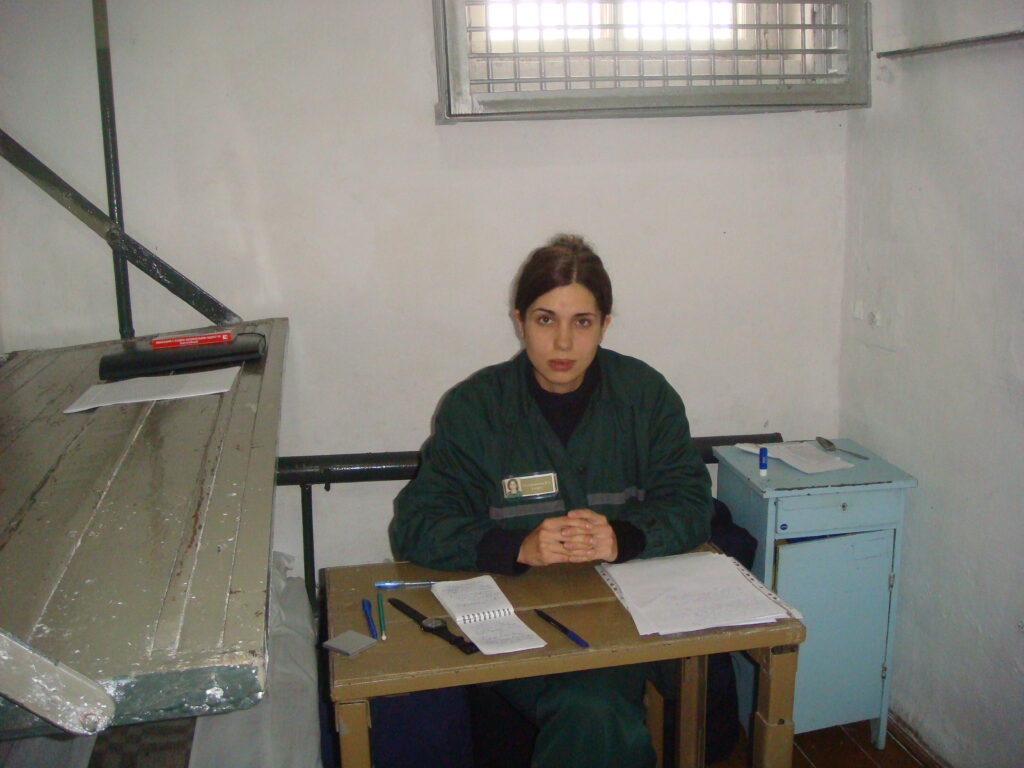
Below is Nadezhda’s story, written literally a day ago, about the reasons that forced her to now begin the fight to change the situation in the camp.
On Monday, September 23, I am going on a hunger strike. This is an extreme method, but I am absolutely sure that this is the only possible way out of the current situation for me.
The colony administration refuses to listen to me. But I will not give up my demands, I will not sit silently, meekly watching how people fall off their feet from the slave conditions of life in the colony. I demand that human rights be respected in the colony, I demand that the law be observed in the Mordovian camp. I demand that we be treated as people, and not as slaves.
It’s been a year since I arrived at IK-14 in the Mordovian village of Partsa. As the female prisoners say, “whoever hasn’t done time in Mordovia hasn’t done time at all.” I started hearing about the Mordovian zones back in SIZO-6 in Moscow. The harshest regime, the longest workday, the most outrageous lack of rights. They escort you to Mordovia as if you were going to an execution. They hope until the very end: “Maybe you’re not going to Mordovia after all? Maybe you’ll get away with it?” I didn’t get away with it, and in the fall of 2012 I arrived in the camp region on the banks of the Partsa River.
Mordovia greeted me with the words of the deputy head of the colony, Lieutenant Colonel Kupriyanov, who is actually in charge of our IK-14: “And know this: my political views are that of a Stalinist.” Another head (they rule the colony in tandem), Colonel Kulagin, called me in for a talk on the very first day, the purpose of which was to force me to admit my guilt. “You have suffered a tragedy in your life. Isn’t that right? You were given two years in prison. And when a person suffers a tragedy in his life, he usually changes his views. You need to admit your guilt in order to leave early on parole. And if you don’t admit it, there will be no parole.” I immediately told the head that I was only going to work the eight hours a day stipulated by the Labor Code. “The code is the code, but the main thing is to meet the production standards. If you don’t meet them, you stay for an extended work day. And anyway, we’ve broken worse here!” Colonel Kulagin replied.
My entire team in the sewing shop works 16-17 hours a day. From 7.30 to 0.30. Sleep – at best four hours a day. A day off happens once every month and a half. Almost all Sundays are working days. Convicts write applications to go to work on a day off with the wording “of their own free will.” In reality, of course, there is no desire. But these applications are written by order at the request of the authorities and the prisoners, transmitting the will of the authorities.
No one dares to disobey (not to write a statement to go to the industrial zone on Sunday, that is, not to go to work until 1 a.m.). A 50-year-old woman asked to go to the residential zone not at 0.30, but at 20.00, so that she could go to bed at 22.00 and sleep eight hours at least once a week. She was feeling unwell, she had high blood pressure. In response, a detachment meeting was called, where the woman was scolded, spat upon and humiliated, branded a parasite. “Are you the one who wants to sleep more than anyone else? You have to work hard, you horse!” When someone from the brigade does not go to work on the doctor’s release, he is also pressured. “I sewed with a temperature of 40, no big deal. But have you thought about who will sew for you?!”
My residential unit in the camp greeted me with the words of one convict serving out her nine-year sentence: “The cops are afraid to press you. They want to do it with the hands of the female prisoners!” The regime in the colony is really set up in such a way that the suppression of a person’s will, intimidation, turning him into a speechless slave is carried out by the hands of convicts holding the posts of brigade foremen and squad leaders, receiving orders from their superiors.
To maintain discipline and obedience, a system of informal punishments is widely used: “sit in the local until lights out” (prohibition to enter the barracks – fall or winter; in the 2nd detachment, the detachment of invalids and pensioners, there is a woman who, after sitting in the local for a day, froze her hands and feet so much that one leg and fingers had to be amputated), “close hygiene” (prohibition to wash and go to the toilet), “close the food storeroom and teahouse” (prohibition to eat your own food, drink drinks). It is both funny and scary when an adult woman of about forty says: “So, today we are punished! I wonder, will they punish us tomorrow too?” She is not allowed to leave the workshop to pee, she is not allowed to take a candy from her bag. It is prohibited.
Dreaming only of sleep and a sip of tea, exhausted, harassed, dirty, the convict becomes obedient material in the hands of the administration, which views us exclusively as free labor. Thus, in June 2013, my salary was 29 (twenty-nine!) rubles. At the same time, the team sews 150 police suits per day. Where does the money received for them go?
The camp was allocated money several times to completely replace its equipment. However, the authorities only repainted the sewing machines with the help of prisoners. We sew on morally and physically outdated equipment. According to the Labor Code, if the equipment level does not meet modern industrial standards, the production rates must be reduced compared to typical industry standards. But the rates only increase. In leaps and bounds. “Show them that you can produce 100 suits, and they will increase the base to 120!” – say experienced motorcyclists. But you cannot not produce – otherwise the entire detachment, the entire brigade will be punished. Punished, for example, by standing on the parade ground for many hours. Without the right to visit the toilet. Without the right to take a sip of water.
Two weeks ago, the production quota for all the colony’s crews was arbitrarily increased by 50 units. And if before that the base was 100 suits per day, now it is equal to 150 police suits. According to the Labor Code, workers must be notified of changes in the production quota no later than two months in advance. In IK-14, we simply wake up one fine day with a new quota, because that’s what the management of our “sweatshop” (that’s what the convicts call the colony) decided to do. The number of people in the crew decreases (they are released or leave), and the quota increases – accordingly, those who remain have to work more and more. The mechanics say that there are no and will not be any parts needed to repair the equipment: “No parts! When will they be? Don’t you live in Russia to ask such questions?” During my first months in the industrial zone, I practically mastered the profession of a mechanic. Forced and on my own. I threw myself at the car with a screwdriver in my hands in the desperate hope of fixing it. Your hands are pierced and scratched by needles, blood is smeared on the table, but you still try to sew. Because you are part of the conveyor production, and you need to perform your operation on par with experienced seamstresses. And the damn machine breaks down and breaks down. Because you are new, and in the camp conditions of a shortage of quality equipment, you, naturally, get the most worthless of the motors on the belt. And then the motor breaks down again – and you again run to look for a mechanic (who is impossible to find). And they shout at you, they prod you for disrupting the plan. There is no training course in sewing skills in the colony. Newcomers are immediately seated at the machine and given the operation.
“If you weren’t Tolokonnikova, you would have been ********* long ago,” say the prisoners close to the bosses. That’s true, others are beaten. For poor academic performance. In the kidneys, in the face. The prisoners themselves do the beatings, and not a single beating in the women’s camp occurs without the approval and knowledge of the administration. A year ago, before I arrived, a gypsy woman was beaten to death in the 3rd detachment (the 3rd detachment is the press detachment, where they put those who need to be subjected to daily beatings). She died in the medical unit of IK-14. The administration managed to hide the fact of death from beatings: they listed a stroke as the cause. In another detachment, new seamstresses who were failing to keep up were stripped and forced to sew naked. No one dares to complain to the administration, because the administration will smile in response and send them back to the detachment, where the “snitch” will be beaten on the orders of the same administration. The colony administration finds controlled hazing convenient as a way to force convicts to totally submit to the lawless regime.
The industrial zone is filled with a threateningly nervous atmosphere. The prisoners, who are always sleep-deprived and exhausted by the endless pursuit of fulfilling the inhumanly huge production quota, are ready to break down, scream at the top of their lungs, and fight over the most trivial of pretexts. Just recently, a young girl had her head pierced with scissors because she had not handed over her trousers on time. Another woman recently tried to stab herself in the stomach with a hacksaw. She was stopped.
Those who lived in IK-14 in 2010, the year of fires and smoke, told how while the fire was approaching the walls of the colony, the prisoners continued to go out to the industrial zone and fulfill their quotas. It was hard to see a person two meters away because of the smoke, but they tied wet scarves over their faces and sewed. They were not taken to the canteen for lunch because of the state of emergency. Several women told how they, terribly hungry, kept diaries at the time, trying to record the horror of what was happening. When the fires ended, the colony’s security department carefully searched these diaries so that nothing would leak out to the outside world.
The sanitary and living conditions of the colony are arranged in such a way that the prisoner feels like a disenfranchised dirty animal. And although the detachments have hygiene rooms, for educational and punitive purposes the colony has created a single “general hygiene room”, that is, a room with a capacity of five people, where the entire colony (800 people) must come to wash themselves. We are not supposed to wash ourselves in the hygiene rooms arranged in our barracks, it would be too convenient. In the “general hygiene room” there is always a crush, and the girls with basins try to quickly wash “their wet nurse” (as they say in Mordovia), climbing on each other’s heads. We exercise the right to wash our hair once a week. However, this bath day is also cancelled from time to time. The reason is a broken pump or a blockage in the sewer. Sometimes the detachment could not wash for two or three weeks.
When the sewerage system gets clogged, urine gushes out of the hygiene rooms and feces fly in clusters. We learned to clean the pipes ourselves, but it doesn’t last long – they get clogged again. And the colony doesn’t have a cable for cleaning. Washing is done once a week. The laundry room looks like a small room with three taps, from which a thin stream of cold water flows.
For educational purposes, the prisoners are always given only stale bread, milk generously diluted with water, exclusively rancid millet and only rotten potatoes. This summer, sacks of slimy black potato tubers were brought to the colony in bulk. That’s what they fed us.
We can talk endlessly about domestic and industrial violations in IK-14. But my main, fundamental complaint about the colony lies in a different plane. It is that the colony administration in the harshest way prevents any complaints and statements concerning IK-14 from leaving its walls. My main complaint about the administration is that they force people to remain silent. Not shying away from the lowest and most vile methods. All the others follow from this problem – an inflated base, a 16-hour workday, etc. The administration feels unpunished and boldly oppresses the prisoners more and more. I could not understand the reasons why everyone is silent until I myself encountered the mountain of obstacles that falls on a prisoner who decides to act. Complaints simply do not leave the colony. The only chance is to file a complaint through relatives or a lawyer. The administration, petty and vindictive, uses all the mechanisms of pressure on the convict so that he understands: his complaints will not make things better for anyone, but will only make things worse. The method of collective punishment is used – you complain that there is no hot water – it is turned off completely.
In May 2013, my lawyer Dmitry Dinze filed a complaint with the prosecutor’s office about the conditions in IK-14. The deputy head of the camp, Lieutenant Colonel Kupriyanov, immediately established unbearable conditions in the colony. Search after search, a wave of reports on all my acquaintances, confiscation of warm clothing and the threat of confiscation of warm shoes. In production, they take revenge with complex sewing operations, an increase in production standards and artificially created defects. The sergeant major of the detachment adjacent to mine, Lieutenant Colonel Kupriyanov’s right hand, openly incited prisoners to cut up the products for which I was responsible in the industrial zone, so that there would be a reason to send me to the punishment cell for damaging “state property”. She also ordered prisoners from her detachment to provoke a fight with me.
You can endure everything. Everything that concerns only you. But the collective colony method of education means something different. Your unit, the entire colony endures together with you. And, what is most vile, those people who have become dear to you. One of my friends was deprived of parole, which she had been working towards for seven years, diligently exceeding the norm at the industrial camp. She was given a reprimand for drinking tea with me. That same day, Lieutenant Colonel Kupriyanov transferred her to another unit. Another good friend of mine, a very intelligent woman, was transferred to the press unit for daily beatings because she read and discussed with me a document from the Ministry of Justice called “Internal Regulations of Correctional Institutions.” Reports were drawn up on all those who had contact with me. It hurt me that people close to me were suffering. Lieutenant Colonel Kupriyanov, smiling, told me then: “You probably have no friends at all anymore!” And he explained that everything that was happening was due to complaints from Dinze’s lawyer.
Now I understand that I should have declared a hunger strike back in May, back in that situation, but seeing the monstrous pressure that was applied to other prisoners, I suspended the process of complaining about the colony.
Three weeks ago, on August 30, I approached Lieutenant Colonel Kupriyanov with a request to ensure that all prisoners in the brigade where I work get eight hours of sleep. The idea was to reduce the workday from 16 hours to 12 hours. “Okay, starting Monday the brigade will work even eight hours,” he replied. I know this is another trap, because it is physically impossible to meet our inflated quota in eight hours. Therefore, the brigade will not be able to keep up and will be punished. “And if they find out that this happened because of you,” the lieutenant colonel continued, “then you will definitely never feel bad again, because there is no such thing as bad in the next world.” The lieutenant colonel paused. “And one more thing – never ask for everyone. Ask only for yourself. I have been working in camps for many years, and anyone who came to me to ask for others was always sent from my office straight to the punishment cell. And you are the first person this will not happen to now.”
Over the next few weeks, an unbearable situation was created in the detachment and at the industrial site. Convicts close to the authorities began to incite the detachment to violence: “You are punished for drinking tea and food, for toilet breaks and smoking for a week. And now you will always be punished if you do not start behaving differently with the newcomers and especially with Tolokonnikova – the way the old-timers behaved with you in their time. Did they beat you? They did. Did they tear your mouths apart? They did. Give them ***** too. Nothing will happen to you for this.”
I was provoked time and again into conflict and fight, but what is the point of conflicting with those who have no will of their own and act at the behest of the administration?
Mordovian convicts are afraid of their own shadow. They are completely intimidated. And if yesterday they were all well disposed towards you and begged you – “do something about the 16-hour industrial work!”, then after the pressure from the authorities falls on me, they are all afraid to even talk to me.
I approached the administration with a proposal to settle the conflict by relieving me of the artificially created pressure from the prisoners under their control, and the colony of slave labor, by shortening the working day and bringing the norm that women must sew into line with the law. But in response, the pressure only increased. Therefore, from September 23, I am declaring a hunger strike and refusing to participate in slave labor in the camp until the colony administration begins to comply with the laws and treat convicted women not as cattle thrown out of the legal field for the needs of the sewing industry, but as people.
Nadezhda Tolokonnikova
